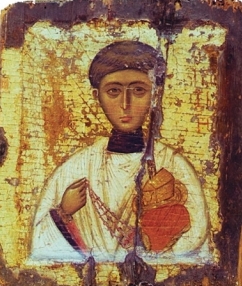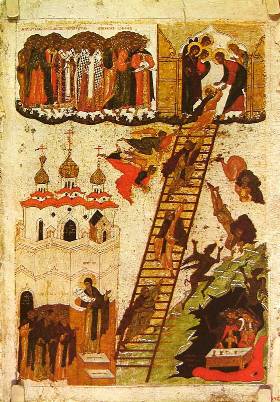

|
The Kartvelologist The Kartvelologist” is a bilingual (Georgian and English) peer-reviewed, academic journal, covering all spheres of Kartvelological scholarship. Along with introducing scholarly novelties in Georgian Studies, it aims at popularization of essays of Georgian researchers on the international level and diffusion of foreign Kartvelological scholarship in Georgian scholarly circles. “The Kartvelologist” issues both in printed and electronic form. In 1993-2009 it came out only in printed form (#1-15). The publisher is the “Centre for Kartvelian Studies” (TSU), financially supported by the “Fund of the Kartvelological School”. In 2011-2013 the journal is financed by Shota Rustaveli National Science Foundation. |
Stephen, the First Martyr, and Georgian Christian Culture
This distinguished saint was also especially venerated in Georgia, though his place in the history of the Georgian church and Georgian culture has not been studied so far. Among several churches erected in honor of St. Stephen, there is a church, which is one of the oldest in Mtskheta, built on the spot where the Georgian nation was baptized, at the confluence of the Mtkvari and Aragvi rivers. The Urbnisi and Khirsi churches founded by the Assyrian Fathers(VI c.) are named after Stephen the First Martyr. The fresco representations of St. Stephen are found in Ateni Sioni, Betania, Tsromi and Nakipari amongst others. The toponym “Stepantsminda” is associated with the name of Stephen the First Martyr who has been mentioned in the Georgian church and old Georgian literature since ancient times. The service of St. Stephen is included in the oldest liturgical books preserved in the Georgian language – Jerusalemite Lectionary and the Oldest Iadgari. Special interest in St. Stephen is revealed by the tenth-century Georgian writer – Stephane Sananoisdze-Chkondideli, who is an author of a small-size hymn dedicated to St. Stephen. He translated from Greek the Praise to St. Stephen the First Martyr composed by Gregory of Nyssa. The data about Stephen the First Martyr, his relics and the oldest church related to the saint have been preserved in original Georgian hagiography too. In this paper, TheLife of St. Nino, the Martyrdom of St. Abo and TheLife of George the Athonite are considered in this context. keywords:Stephen the First Martyr, Georgian Christian Culture Category: SCHOLARLY STUDIES Authors: Lela Khachidze The Importance of the Georgian Translations of The Ladder of Divine Ascent by John Climacus for Georgian and Byzantine Philology
In The Ladder John usually refrains from giving detailed directions about what food to eat, how much and when, about hours of sleep and the daily program of manual labour.What matters for him is not physical asceticism but humility and purity of heart.
keywords:John Climacus, The Ladder of Divine Ascent Category: SCHOLARLY STUDIES Authors: Irma Makaradze Textual Commentaries to "The Man in the Panther Skin": Who does Rustaveli Refer to as a Witness and Why?
The present article comments on one line from the MPS which has often been the subject of discussion in Rustaveli literature: “Dionosi the wise, Ezros bear me witness in this“ („ამ საქმესა მემოწმების დიონოსი, ბრძენი ეზროს“). The idea that Rustaveli refers to the Greek God of love, Eros, as a witness is suggested by the author of the article. The published version of the line is not considered to be the original text, but rather an error introduced by scribes who copied the manuscript over the centuries. keywords:Rustaveli, Plato, Dionosi, Devanosi, Eros, Symposium Category: SCHOLARLY STUDIES Authors: ELGUJA KHINTIBIDZE Textual Commentaries to "The Man in the Panther Skin": Summarizing the Rustavelian Theory of Poetry
There are two reasons, due to which the need arises for a novel interpretation of the 17th stanza from the Prologue to The Man in the Panther Skin: 1) it is necessary to clarify or even revise N. Marr’s interpretation of the above stanza, which was recognized to be correct by researchers of Rustaveli’s poem in order to explain in any possible way the apparent consequential inconsistency that seems to exist between the second half-line of 17.4 (17.4b) and the first half-line of 12.4 (12.4a); 2) within the framework of the 17th stanza several peculiarities of various types are observed, which require explanation. The study conducted in the above-indicated direction revealed, that - as opposed to one of the newly proposed scholarly assumptions - the 17th stanza, as expected, not only cannot be regarded as a later insertion in the text of the poem, but it brings together and summarizes Rustaveli's whole aesthetic conception, reflected in the form of a unified discourse within all six stanzas (12-17) depicting the Rustavelian theory of poetry.
keywords:Rustaveli, “The Man in the Panther Skin”, prologue, Aristotle, Poetics. Category: SCHOLARLY STUDIES Authors: Zaza Khintibidze |
Categories Journal Archive |



 Stephen the First Martyr is one of the most popular saints of the Christian church. Lots of churches were built in honor of St. Stephen over the course of centuries. Numerous frescoes, artistic paintings, hymns and homilies were dedicated to him.
Stephen the First Martyr is one of the most popular saints of the Christian church. Lots of churches were built in honor of St. Stephen over the course of centuries. Numerous frescoes, artistic paintings, hymns and homilies were dedicated to him. The Ladder of Divine Ascent by John Climacus is an acknowledged as one of the most popular and most accomplished medieval manual of morality. Christian ethical principles embraced by the work are presented in a systemised form, with a distinctive emphasis and employing deeply theological discussions. Climacus was by no means the first author to present spiritual life as a sequence of stages. Various other authors used the image of the ladder to describe spiritual life, such as Philo of Alexandria, Origen, Syriac fathers, Gregory of Nissa, however John Climacus was the first one to use this image so extensively as to present in it the entire picture of spiritual ascent [11,pp.22-23]. This is one crucial differentiating feature distinguishingThe Ladder of Divine Ascentfrom other works of the genre. Another feature is its psychological contents: refined, sophisticated psychologism, a deep knowledge of human beings’ nature and their inner world shine through to the climax of the story [3,p.43].
The Ladder of Divine Ascent by John Climacus is an acknowledged as one of the most popular and most accomplished medieval manual of morality. Christian ethical principles embraced by the work are presented in a systemised form, with a distinctive emphasis and employing deeply theological discussions. Climacus was by no means the first author to present spiritual life as a sequence of stages. Various other authors used the image of the ladder to describe spiritual life, such as Philo of Alexandria, Origen, Syriac fathers, Gregory of Nissa, however John Climacus was the first one to use this image so extensively as to present in it the entire picture of spiritual ascent [11,pp.22-23]. This is one crucial differentiating feature distinguishingThe Ladder of Divine Ascentfrom other works of the genre. Another feature is its psychological contents: refined, sophisticated psychologism, a deep knowledge of human beings’ nature and their inner world shine through to the climax of the story [3,p.43].